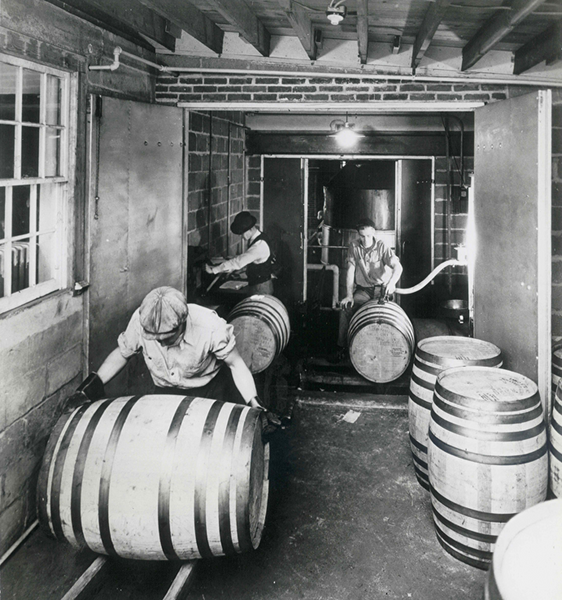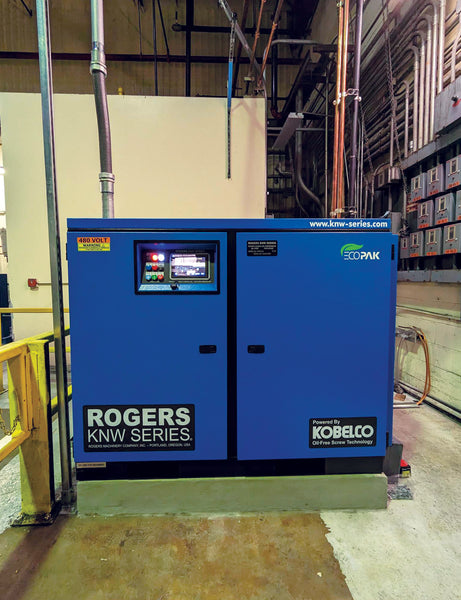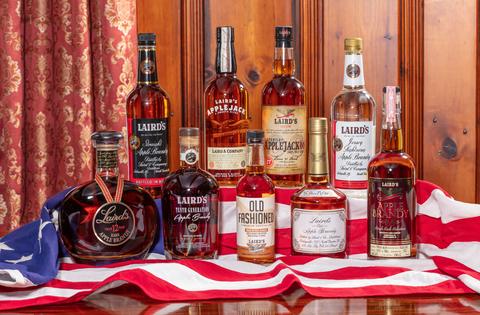Your Cart is Empty

In the Spirit of Improvement: Nation's Oldest Distiller Takes Practical Approach to Compressed Air System Upgrade
Laird & Company has been pioneering and perfecting Applejack brandy for 325 years. Laird & Company produces eight expressions of their iconic apple distillate, as well as a ready-to drink cocktail. In particular, their internationally known “Applejack” has earned the reputation as a quality product produced by a quality company using quality equipment to do so. In the interest of supporting facility uptime and Laird & Company’s personnel productivity, it was time for an upgrade.
Table of Contents
- From Scotland to Serving Applejack Brandy to General George Washington
- Upgrading to an Oil-Free, Two-Stage, Rotary Screw Air Compressor
- Compressed Air Audits Performed by Air & Gas Technologies and Rogers Machinery
- VSD Air Compressors Aren't Always the Right Solution
- A Closed Loop Cooling System
From Scotland to Serving Applejack Brandy to General George Washington
Laird & Company has been pioneering and perfecting Applejack brandy for 325 years. In 1698, William Laird immigrated from County Fyfe, Scotland to Monmouth County, New Jersey, bringing nothing but the distillation skills of his homeland with him. Keen to experiment with the ingredients of the New World, William began to dabble in the distillation of the most abundant crop in the area – apples. He began sharing the spirit fondly known as “Jersey Lightning”. This “cyder spirit” grew in popularity and the torch passed from William to his son Alexander Laird, and then to his son Robert Laird.
Along with being a craft distiller, Robert Laird also served in General George Washington’s Revolutionary Army. After having tried the family’s experimental spirit, General Washington wrote a letter to the Lairds asking for their spirit recipe. The recipe was shared with the first general and he served applejack to his fellow troops, providing a quality libation that served as liquid courage in the battle against the British.
After garnering nearly a century’s worth of experience refining their apple spirit, and just four short years after the birth of our great nation, Laird & Company was officially established in 1780. They hold the unique distinction today as America’s oldest distillers, and were granted the first ever bonded warehouse in the country by the federal government, along with DSP NJ-1 (Distilled Spirits Plant New Jersey-1).
Starting with humble roots as a family distillery making Applejack for friends and neighbors in a building located behind the Colts Neck Inn, and serving as a pit stop for stagecoach travelers in the early 1700’s, today, Laird & Company produces eight expressions of their iconic apple distillate, as well as a ready-to drink cocktail. In particular, their internationally known “Applejack” has earned the reputation as a quality product produced by a quality company using quality equipment to do so.

Laird & Co. employees filling barrels with apple brandy to be aged, circa 1935.
Key Takeaways
- Modernization of Legacy Systems:Laird & Company, with over 320 years of history, undertook a practical approach to upgrade their compressed air systems, ensuring alignment with contemporary production needs.
- Collaborative Solution Development: Partnering with Rogers Machinery, the distillery implemented tailored solutions that enhanced efficiency and reliability without disrupting their traditional processes.
- Balancing Tradition with Innovation: The upgrade exemplifies how historic enterprises can integrate modern technology to improve operations while preserving their heritage.
Upgrading to an Oil-Free, Two-Stage, Rotary Screw Air Compressor
One such piece of quality equipment was their 40+ year-old oil-free air compressor, which was recently retired and replaced with a brand-new Rogers KNW Series water-cooled, two-stage, oilfree rotary screw air compressor. Having worked closely together with their air compressor service provider, Air & Gas Technologies located in Keyport, NJ, for the past 26 years, the need for the upgrade had been on the minds of Laird’s management for quite some time.
However even with difficult obstacles like parts obsolescence, the collective team had managed to keep the old unit running for many years beyond typical life expectancy. Laird personnel even had the foresight long ago to purchase an old spare identical compressor to utilize its parts whenever they would be needed in a pinch, but even this compressor was now looking rather bare. They knew relying on the aging, existing compressor for much longer may put their facility at risk of unplanned downtime.
According to the VP of Production, the plant operates 9.5 hours per day, as a single shift operation, and has multiple production and filling lines running as well as a rectifying department that blends and filters the liquid. Oil-free, clean, dry, and filtered compressed air is used directly to mix and move products through hoses during the filtering and bottling process. The quality and reliability of the compressed air system is critical to the operation.
In the interest of supporting facility uptime and Laird & Company’s personnel productivity, it was time for an upgrade.

The new Rogers KNW Series Oil-Free Rotary Screw Air Compressor supporting Laird & Co’s Scobeyville, NJ distillery operations.
Compressed Air Audits Performed by Air & Gas Technologies and Rogers Machinery
Like many of the system upgrades that occur today, energy efficiency was a factor considered for the type of equipment. However, Laird & Company knew based on their long history that too heavily weighing efficiency by making sacrifices in other important factors like installation cost, reliability, and serviceability had the potential to cost them more in the long run.
With the support of Air & Gas Technologies and Rogers Machinery, they took a practical approach and considered all pertinent aspects in their choice of the new equipment. To determine the right size compressor air audits were performed at two separate times with different products being produced.
Concluding in 2022, a third look at the system flow demands helped provide data during dissimilar times in production. While the distilling and bottling process air consumption ebbs and flows based on product demand and buyers’ tastes, the data revealed the system’s overall air consumption remained relatively consistent in all three evaluations.
This proved that the existing 100 hp, fixed speed, load/unload compressor with across-the-line starting had excess capacity. With energy savings to be had, this would further help justify the upgrade. Calculations showed the overall performance of 2.1 ACFM/kW for the existing compressor could be improved to 5.0 ACFM/kW or more by using the right size compressor.

All of the apple expressions. Laird’s Straight Apple Brandy Bottled in Bond, Blended Applejack, Straight Applejack 86, Jersey Lightning (Top row, from left to right), Laird’s 12 Year Old Rare Apple Brandy, 10th Generation Straight Apple Brandy, Ready to Drink Old Fashioned, Old Apple Brandy 7 1⁄2 Year, Single Cask Select (Bottom row, from left to right).
VSD Air Compressors Aren't Always the Right Solution
A variable speed drive (VSD) air compressor was considered to maximize part load energy efficiency. However, the facility’s electrical infrastructure posed a big challenge to this: the building’s main power is 208v/3ph. So, a VFD for the right size compressor would have to be approximately 2.5x the size of a comparable size 460v VFD. The copper wiring for a dedicated 208v package would also add significant cost to the electrical installation. While this could be solved by using a transformer and keeping the new compressor’s voltage 460v, this led to discussions about how much energy a VSD would even save in comparison to the already high efficiency of the smaller load/unload compressor being considered. A dedicated 208v variable speed compressor was ruled out due to the significantly higher installation and purchase costs.
After looking at the payback in comparison to the average VSD life expectancy for the much more industry standard 460v package, it still didn’t make financial sense since the smaller load/unload compressor was already highly efficient and designed to far outlast a VSD. Also, not having a VSD simplifies the compressor
package and removes a major electronic device as a potential point of failure from the system entirely, bolstering system reliability.
Lastly, by downsizing to a 75 hp compressor with a solid-state (soft) starter, this would greatly reduce the facility’s demand charges compared to the existing 100 hp air compressor with an across-the-line starter. Those working closely on the project had realized what many compressed air professionals work to educate their clients about wherever it applies: variable speed compressors are a viable solution for many compressed air systems, but not all of them.
The cost of both the wiring and electrical installation for a 460v package, with the initial cost of the transformer factored in, was on par with a dedicated 208v package for the load/unload configuration. However, with 460v motors and other electrical components being less expensive and more readily available, choosing 460v for the package voltage would set the system up for long-term uptime success.
A Closed Loop Cooling System
As for the last remaining aspect of the air compressor package, it was the easiest of them all: cooling. The existing system had utilized a HydroThrift closed loop cooling system since 1988. It provided over thirty (30) years of reliable service, and the new compressor package features reliable shell-and-tube style heat exchangers. Since personnel at Laird were familiar with water-cooled heat exchangers and their forgiving nature in comparison to air-cooled, a new HydroThrift closed loop system was installed to complement the new compressor package. The existing refrigerated air dryer with filtration remains in use in the system.
This example of how Laird & Company carefully considered multiple aspects for their new compressor provides an important reminder for both suppliers and users of compressed air systems. Energy efficiency is an important consideration when choosing the right equipment, and with the prevalence of variable frequency drives in modern industrial equipment, it is only natural to gravitate toward the common fallback of a variable speed compressor.
However, it is prudent to remember: ‘at what cost.’ For the long-term success of a compressed air system and the facility it supports, other key factors like reliability should not be overlooked. Ultimately the 75 hp load/unload compressor configured as 460v/3ph, water-cooled, was chosen as it was the best balance of initial investment, energy efficiency, installation cost, and long-term reliability and serviceability. The demand charge reductions have provided an immediate payback of over $1,000/month consistently off the facility’s electric bills.
The parts obsolescence issues with the old compressor are no longer a concern, and they are saving on service costs with preventative maintenance being performed without multiple breakdown occurrences. As the future of Laird & Company continues to flourish through the 8th, 9th and 10th generation family, Laird & Company has made the investment in the future of its business with high quality, reliable, domestically manufactured equipment supported by local, reliably competent service providers.

Star Cocktail, a variation of the Manhattan and a true classic cocktail that first appeared in print in George J. Kappeler’s 1895 bartending guide, “Modern American Drinks”. The recipe for Star Cocktail can be found here: https://lairdandcompany.com/recipes/star-cocktail-2
Want to learn more about our KNW Series oil-free compressors? Follow this link to start diving deeper.





